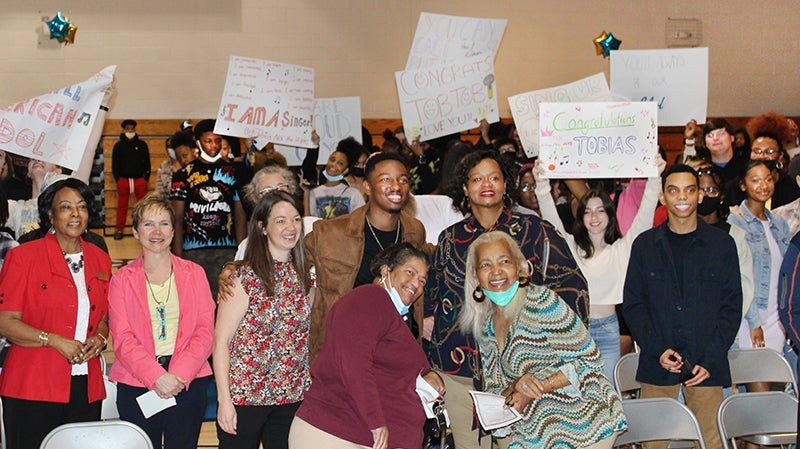Mayor’s March
Published 12:04 pm Thursday, July 17, 2014
POWELLSVILLE – He’s a Republican mayor in a largely Democratic area of eastern North Carolina.
A graduate of N.C. State, who also attended Pungo Christian Academy and later became a successful insurance and securities broker, lifelong Beaufort County resident Adam O’Neal hardly fits the mold of activist.

Belhaven Mayor Adam O’Neal (left) flashes the thumbs up sign while author and activist Bob Zellner (right) waves to a passing motorist on Dilday Road in Bertie County Wednesday. The two men are walking 273 miles from Belhaven to Washington, DC to draw attention to what they consider a health care crisis that threatens the rural Beaufort County coastal community. Staff Photo by Gene Motley
Nevertheless, here he is traipsing past the corn and cotton fields of the Tar Heel state en route to the nation’s capital – 273 miles away – to draw attention to what he feels is the health care crisis threatening his rural coastal community.
The Belhaven mayor’s mission comes following the closure of the area’s only hospital, Vidant Pungo Hospital in Belhaven, which served over 20,000 people in Beaufort and Hyde counties: an area of North Carolina with higher-than-average poverty rates and where many residents are uninsured according to the Institute for Southern Studies.
“We had an independent hospital there that was being run by local people and it was being allowed to be run a little bit sloppily,” O’Neal said over lunch at an Ahoskie restaurant. “So the community board reached out to Vidant to come in and take over the hospital.”
O’Neal says back in 2011 the Beaufort and Hyde counties community gave Vidant the hospital and all its assets and liabilities and in return Vidant promised to strengthen and maintain the hospital in the future. However, by September of last year Vidant announced it was closing the hospital. The mayor then rallied the town with public forums seeking to avoid the closure.
“They (Vidant) had no concern for Belhaven and the people of the surrounding area,” O’Neal continued. “I explained to them the economic devastation it would be to our community and they didn’t have much interest in what I was saying.”
A later, second rally produced an offer from Vidant to build and staff a 24/7 clinic; but it is not a critical access hospital. The NAACP also became involved and filed a Title VI complaint in January. The complaint alleges Vidant took actions that take a disproportionate effect on minorities.
“When you take federal funds and you’re an organization like Vidant, you can’t just one day decide not to serve people a certain way,” O’Neal contends.
After the complaint filing a mediator came from Washington, DC and helped forge an agreement. This arrangement kept the hospital open for another 90 days beginning April 1.
“We thought we had a deal worked out, but Vidant then started trying to change the deal,” O’Neal said. “The first line of the agreement said that Vidant Health would transfer all tangible assets of the hospital to the new community-organized board for the transition.”
Vidant and the community disagreed on what constituted assets of the corporation and that stand-off resulted in the hospital’s closing on July 1.
Less than two weeks later, the mayor has taken to the road.
“We’re doing this walk because we want to bring attention to our situation where we had a health-care conglomerate come to our town, promise to maintain its 24 hour hospital, and then closed it,” O’Neal said. “They didn’t just close a hospital, they closed a critical-access hospital; their clinic does not provide emergency care. All we have is a 24 hour doctor’s office, a primary-care clinic.”
O’Neal also wants to ask Congress to enact a law to keep critical-care hospitals open unless Health & Human Services (HHS) signs off on it.
“It should not be up to a multi-billion dollar corporation, that is claiming to be a non-profit, to come in and decide people’s health care needs in these critical areas,” he stressed.
O’Neal said there is now an additional half-hour drive for critical care treatment to Washington, NC. He also hopes to get Congress’ ear to give communities at least one year to save their hospitals if someone has come in and bought them and says they’re going to close them.
“We have a model that will work called ‘The Belhaven Model’,” O’Neal said. “It means right-sizing the hospital and putting in an accountable care organization. Our hospital had 45 beds and 129 employees; it really needed 10 beds and 55 employees.”
“Vidant closed our hospital not because nobody could make it work,” he added. “They closed it because they wanted to force people to drive to Washington. Now all the poor people in Belhaven who don’t have a car don’t have any medical care because they can’t get to Washington to an emergency room.”
O’Neal says the hospital serves people within a 70-80 mile radius and in addition to hospitals in Washington and Plymouth, some people now have to travel US-264 to Nags Head and the Outer Banks.
“That’s sometimes a horrible, winding, up-and-down road,” he maintains.
O’Neal’s final point he hopes to make in Washington just might run contrary to the policies expressed by the leadership within his own party. Because most Southern states, including North Carolina, have opted not to expand the Medicaid health care program for the poor and disabled under the Affordable Care Act.
“Not accepting Medicaid expansion is costing the North Carolina health care system $2-billion a year, and it’s preventing 500,000 people from having health insurance,” he says. “That’s $2-billion in our state’s health-care system that would have been there.”
O’Neal and his supporters have hopes of meeting with Attorney General Eric Holder and possibly even President Obama. In the meantime, he’ll trek 20 miles a day taking short breaks every five miles.
“I guess I just feel that this is so wrong, and that the more attention it gets the better chances of a good outcome for the community,” he said.


